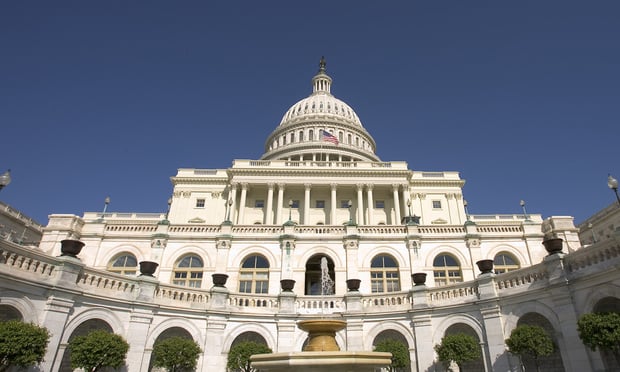Law Firms Predict Mixed Business Impacts From Election Outcome
Which practices could see an uptick in work as the dust settles after Tuesday's midterms?
November 07, 2018 at 03:50 PM
6 minute read
 U.S. Capitol Building. Photo: Diego M. Radzinschi/ALM
U.S. Capitol Building. Photo: Diego M. Radzinschi/ALM
Law firm leaders on Wednesday were still studying the impact of the 2018 election results on their business, but noted some practices, such as government relations and New York real estate, may see a significant change in business and practices.
Still, for law firms, much of the impact going forward is unclear, especially with the election being followed Wednesday by the sudden resignation of Attorney General Jeff Sessions. While a few firms may benefit from representing targets or witnesses in potential House investigations on President Donald Trump, for example, that alone won't represent a sea change in business for litigation firms.
So far, “the total amount of all the defense costs associated with representing witnesses and targets in the Mueller investigation” isn't a material change to the overall litigation marketplace, said John Kiernan, a partner at Debevoise & Plimpton who formerly co-chaired its litigation department,
“The thing that truly changes the litigation marketplace is not congressional investigations. It's fundamental changes in mood about regulatory enforcement,” Kiernan said, adding that he doesn't expect a huge shift on the enforcement front in the next two years.
Still, Gwen Mellor, law firm management consultant at the Zeughauser Group and formerly a managing principal of the Podesta Group lobbying firm, said the “next two years could offer a significant opportunity” for firms with a Washington, D.C., presence. While there's now much attention focused on how the House Oversight and Government Reform Committee, expected to be led by Rep. Elijah Cummings, will investigate Trump, “if they also have the bandwidth, they will also turn their attention to private sector investigations,” Mellor said.
Mellor noted that Cummings has conducted robust investigations of corporate entities in the past. Law firms that have “strong oversight and investigation practices will be very well positioned going forward,” she said.
And for those lawyers looking to move into the public sector, now is a good time, she said, predicting some midlevel associates may join House committees or individual House member offices. “It's a great opportunity for a lawyer who essentially wants to move out of a law firm to get a little exposure on the policymaking side. A lot of jobs are being filled on the House side,” she said.
Any effect on law firm M&A practices is unclear. Mellor said she predicted more certainty in the business climate, potentially leading to more deals. Businesses now have another avenue in which they can raise their profile or business needs, she said.
Herrick Feinstein partner Scott Mollen, optimistic about potential bipartisan efforts, said the division of power “often enhances the likelihood of compromise” and “many people in the business community think a division of power actually improves the business climate.”
Still, one law firm leader said a flurry of investigations on the president by the House, or by a prosecutor who believes a sitting president can be indicted, may impact the stability of the economy in that the White House may be too distracted to manage trade policy or other policies affecting the economy. Already, “the trade wars we're experiencing right now contributes an enormous amount of volatility in the market,” the lawyer said.
Of course, law firm government relations practices traditionally stand to gain more business through any change in leadership. Those government relations practices with a team of diverse attorneys who could court the new Democratic majority in the House will be most in demand, Mellor said.
New York Factors
With Democrats gaining control of the state Senate in New York, criminal defense attorneys could see more criminal justice reforms. With a distinctive Democratic majority in the New York legislature now, and a governor eager to demonstrate his progressiveness, “I think it's very possible we'll see a lot of legislative change,” including criminal justice reform, Kiernan said.
One big unknown for defense law firms going forward is the posture of the new attorney general in New York. It's unclear whether Letitia James will have an aggressive streak toward Wall Street.
“If there's something to watch for in the next six months, it's how Letitia James begins to articulate what her priorities are, particularly in this environment,” said Michael Campion Miller, managing partner of Steptoe & Johnson's New York office.
In real estate, “law firms that do condominium and co-op work will be watching to see if there will be changes in bureau chiefs,” said Mollen, the Herrick partner. In condominium and co-op law, he said, lawyers will look to see whether there will be any change in the allocation of agency resources or policies or procedures for the filing of offering plans and amendments and enforcement at the attorney general's office.
New York state lobbying practices, particularly those geared toward the real estate industry, will see a boost in business as a result of Democratic control of the state Senate.
“Historically, some of the proposed legislation that had been viewed as extremely unfair to the real estate industry has been moderated or stopped by the Republican majority in the Senate,” Mollen said. “Going forward, owners, developers, lenders are likely to require greater government regulations expertise and assistance in dealing with the Democratic side of the chamber.”
Now real estate lawyers and their clients are concerned about a push toward more aggressive tenant protection laws.
For his part, Sam NeJame, who leads Greenberg Traurig's New York state government law and policy practice and who represents powerful real estate entities such as the Real Estate Board of New York, said REBNY “has spent considerable time over the last several years building relationships with both sides of the aisle and we expect to continue to do so and as a result look to have a positive working relationship with the new Senate.”
Overall, NeJame said he anticipates an uptick in business for his government relations practice. “Anytime change occurs,” he said, government affairs practices “will see an uptick in people who need to know how to navigate the new structure.”
Read More:
After Midterms, Lawyers and Lobbyists Look for Opportunities in Divided Government
This content has been archived. It is available through our partners, LexisNexis® and Bloomberg Law.
To view this content, please continue to their sites.
Not a Lexis Subscriber?
Subscribe Now
Not a Bloomberg Law Subscriber?
Subscribe Now
NOT FOR REPRINT
© 2025 ALM Global, LLC, All Rights Reserved. Request academic re-use from www.copyright.com. All other uses, submit a request to [email protected]. For more information visit Asset & Logo Licensing.
You Might Like
View All

Courts Beginning to Set Standards for Evidence Relying Upon Artificial Intelligence
4 minute read
NY Judge Admonished Over Contributions to Progressive Political Causes

Attorneys ‘On the ‘Move: Morrison Cohen Expands White Collar Practice; O’Melveny Brings Back Corporate Finance Partner
6 minute readTrending Stories
- 1Lavish 'Lies' Led to Investors Being Fleeced in Nine-Figure International Crypto Scam
- 2AstraZeneca Files Flurry of Lawsuits to Protect Cancer Treatment Drug
- 3American Airlines Legal Chief Departs for Warner Bros. Discovery
- 4New Montgomery Bar President Aims to Boost Lawyer Referral Service
- 5Deadline Extended for Southeastern Legal Awards
Who Got The Work
Michael G. Bongiorno, Andrew Scott Dulberg and Elizabeth E. Driscoll from Wilmer Cutler Pickering Hale and Dorr have stepped in to represent Symbotic Inc., an A.I.-enabled technology platform that focuses on increasing supply chain efficiency, and other defendants in a pending shareholder derivative lawsuit. The case, filed Oct. 2 in Massachusetts District Court by the Brown Law Firm on behalf of Stephen Austen, accuses certain officers and directors of misleading investors in regard to Symbotic's potential for margin growth by failing to disclose that the company was not equipped to timely deploy its systems or manage expenses through project delays. The case, assigned to U.S. District Judge Nathaniel M. Gorton, is 1:24-cv-12522, Austen v. Cohen et al.
Who Got The Work
Edmund Polubinski and Marie Killmond of Davis Polk & Wardwell have entered appearances for data platform software development company MongoDB and other defendants in a pending shareholder derivative lawsuit. The action, filed Oct. 7 in New York Southern District Court by the Brown Law Firm, accuses the company's directors and/or officers of falsely expressing confidence in the company’s restructuring of its sales incentive plan and downplaying the severity of decreases in its upfront commitments. The case is 1:24-cv-07594, Roy v. Ittycheria et al.
Who Got The Work
Amy O. Bruchs and Kurt F. Ellison of Michael Best & Friedrich have entered appearances for Epic Systems Corp. in a pending employment discrimination lawsuit. The suit was filed Sept. 7 in Wisconsin Western District Court by Levine Eisberner LLC and Siri & Glimstad on behalf of a project manager who claims that he was wrongfully terminated after applying for a religious exemption to the defendant's COVID-19 vaccine mandate. The case, assigned to U.S. Magistrate Judge Anita Marie Boor, is 3:24-cv-00630, Secker, Nathan v. Epic Systems Corporation.
Who Got The Work
David X. Sullivan, Thomas J. Finn and Gregory A. Hall from McCarter & English have entered appearances for Sunrun Installation Services in a pending civil rights lawsuit. The complaint was filed Sept. 4 in Connecticut District Court by attorney Robert M. Berke on behalf of former employee George Edward Steins, who was arrested and charged with employing an unregistered home improvement salesperson. The complaint alleges that had Sunrun informed the Connecticut Department of Consumer Protection that the plaintiff's employment had ended in 2017 and that he no longer held Sunrun's home improvement contractor license, he would not have been hit with charges, which were dismissed in May 2024. The case, assigned to U.S. District Judge Jeffrey A. Meyer, is 3:24-cv-01423, Steins v. Sunrun, Inc. et al.
Who Got The Work
Greenberg Traurig shareholder Joshua L. Raskin has entered an appearance for boohoo.com UK Ltd. in a pending patent infringement lawsuit. The suit, filed Sept. 3 in Texas Eastern District Court by Rozier Hardt McDonough on behalf of Alto Dynamics, asserts five patents related to an online shopping platform. The case, assigned to U.S. District Judge Rodney Gilstrap, is 2:24-cv-00719, Alto Dynamics, LLC v. boohoo.com UK Limited.
Featured Firms
Law Offices of Gary Martin Hays & Associates, P.C.
(470) 294-1674
Law Offices of Mark E. Salomone
(857) 444-6468
Smith & Hassler
(713) 739-1250






